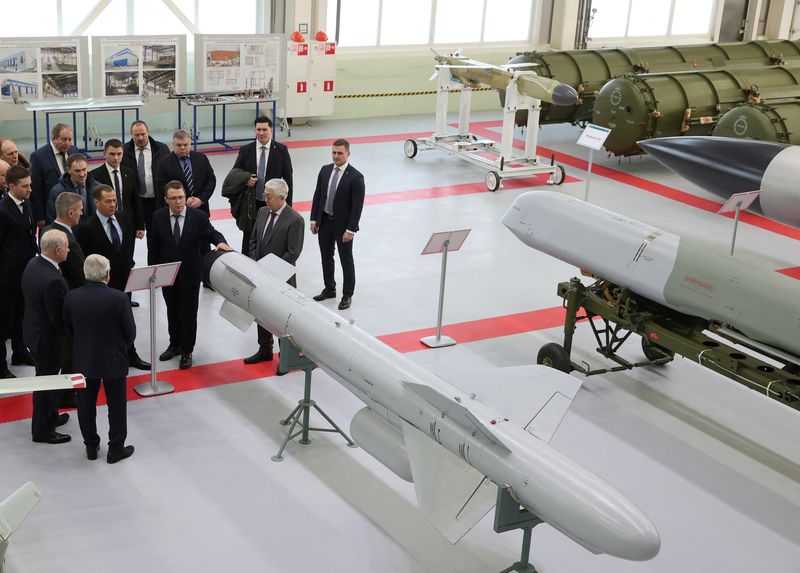Russia formally withdraws from key post-Cold War European armed forces treaty
2023.11.07 02:15
2/2

© Reuters. FILE PHOTO: Deputy head of Russia’s Security Council and chairman of the United Russia party Dmitry Medvedev visits the Raduga State Machine Building Construction Bureau named after A. Bereznyak in Dubna, Moscow region, Russia February 2, 2023. Sputnik/Ye
2/2
By Guy Faulconbridge and Lidia Kelly
MOSCOW (Reuters) – Russia on Tuesday formally withdrew from a landmark security treaty which limited key categories of conventional armed forces, blaming the United States for undermining post-Cold War security with the enlargement of the NATO military alliance.
The 1990 Treaty on Conventional Armed Forces in Europe (CFE), signed a year after the fall of the Berlin Wall, placed verifiable limits on categories of conventional military equipment that NATO and the then-Warsaw Pact could deploy.
The treaty was designed to prevent either side of the Cold War from amassing forces for a swift offensive against the other in Europe, but was unpopular in Moscow as it blunted the Soviet Union’s advantage in conventional weapons.
Russia suspended participation in the treaty in 2007 and halted active participation in 2015. More than a year after the full-scale invasion of Ukraine, President Vladimir Putin in May signed a decree denounced the pact.
Russia’s foreign ministry said Russia had formally withdrawn from the pact at midnight – and that the treaty was now “history”.
“The CFE Treaty was concluded at the end of the Cold War, when the formation of a new architecture of global and European security based on cooperation seemed possible, and appropriate attempts were made,” the ministry said.
Russia said the U.S. push for enlargement of NATO had led to alliance countries “openly circumventing” the treaty’s group restrictions, and added that the admission of Finland into NATO and Sweden’s application meant the treaty was dead.
“Even the formal preservation of the CFE Treaty has become unacceptable from the point of view of Russia’s fundamental security interests,” the ministry said, noting that the United States and its allies did not ratify the updated 1999 CFE.
The war in Ukraine has triggered the worst crisis in Moscow’s relations with the West since the depths the Cold War. Kremlin spokesman Dmitry Peskov said over the weekend that relations with the United States were below zero.
After Russia announced its intention to exit the treaty this year, NATO condemned the decision, saying it undermined Euro-Atlantic security.
“Russia has for many years not complied with its CFE obligations,” NATO said in June. “Russia’s war of aggression against Ukraine, and Belarus’ complicity, is contrary to the objectives of the CFE Treaty.”
The United States and its allies had linked ratification of the adapted 1999 CFE to Russia fulfilling commitments on Georgia and Moldova. Russia said that linkage was wrong.
In 2011, in response to the Russian “suspension”, which Washington said was not legal under the treaty, the United States and NATO ceased implementing it in relation to Russia, according to the State Department.
“Russia’s ‘suspension’ of Treaty implementation since 2007 has seriously eroded the Treaty’s verifiability, decreased transparency, and undermined the cooperative approach to security that have been core elements of the NATO-Russia relationship and European security for more than two decades,” the State Department said in 2020.








